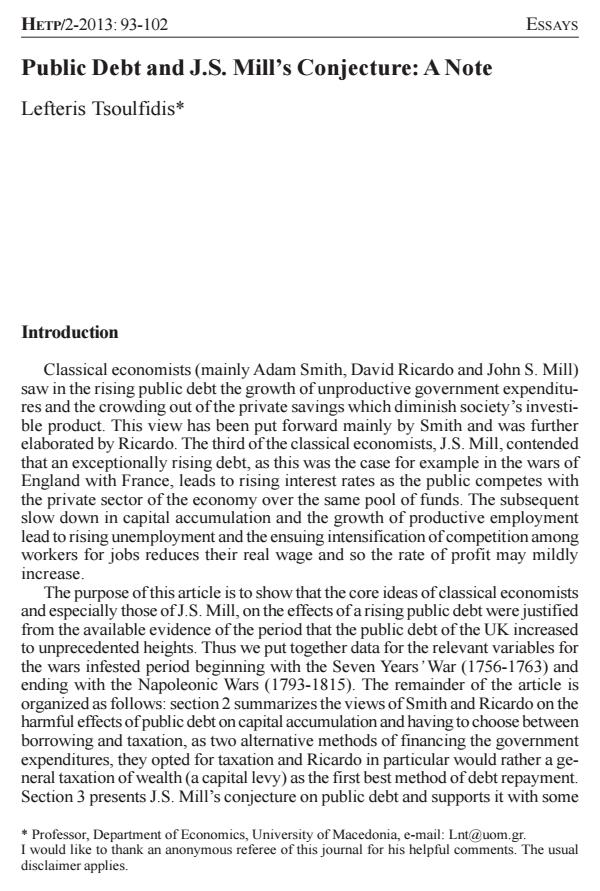Public Debt and J.S. Mill’s Conjecture: A Note
Titolo Rivista HISTORY OF ECONOMIC THOUGHT AND POLICY
Autori/Curatori Lefteris Tsoulfidis
Anno di pubblicazione 2013 Fascicolo 2013/2
Lingua Inglese Numero pagine 10 P. 93-102 Dimensione file 64 KB
DOI 10.3280/SPE2013-002005
Il DOI è il codice a barre della proprietà intellettuale: per saperne di più
clicca qui
Qui sotto puoi vedere in anteprima la prima pagina di questo articolo.
Se questo articolo ti interessa, lo puoi acquistare (e scaricare in formato pdf) seguendo le facili indicazioni per acquistare il download credit. Acquista Download Credits per scaricare questo Articolo in formato PDF

FrancoAngeli è membro della Publishers International Linking Association, Inc (PILA)associazione indipendente e non profit per facilitare (attraverso i servizi tecnologici implementati da CrossRef.org) l’accesso degli studiosi ai contenuti digitali nelle pubblicazioni professionali e scientifiche
Classical economists - mainly Smith, Ricardo and J.S. Mill - abhorred public debts because of their interference with capital accumulation. J.S. Mill in particular envisaged that a rising public debt leads to higher interest rates and falling real wages, a combination which may be consistent with a mildly increasing trend in the profit rate.
Parole chiave:Classical Economists, Public Debt, J.S. Mill, Ricardian Equivalence
Jel codes:B12, B13, B14, B16, H50
- Ricardo’s Labor Theory of Value Is Alive And Well in Contemporary Capitalism Lefteris Tsoulfidis, in World Review of Political Economy /2021
DOI: 10.13169/worlrevipoliecon.12.4.0493 - The History of the Political Economy of Public Debt Nicholas J. Theocarakis, in SSRN Electronic Journal /2014
DOI: 10.2139/ssrn.2535293 - Competing Schools of Economic Thought Lefteris Tsoulfidis, pp.77 (ISBN:978-3-031-58579-1)
- Competing Schools of Economic Thought Lefteris Tsoulfidis, pp.365 (ISBN:978-3-031-58579-1)
Lefteris Tsoulfidis, Public Debt and J.S. Mill’s Conjecture: A Note in "HISTORY OF ECONOMIC THOUGHT AND POLICY" 2/2013, pp 93-102, DOI: 10.3280/SPE2013-002005